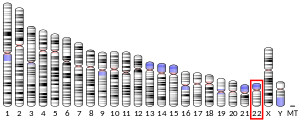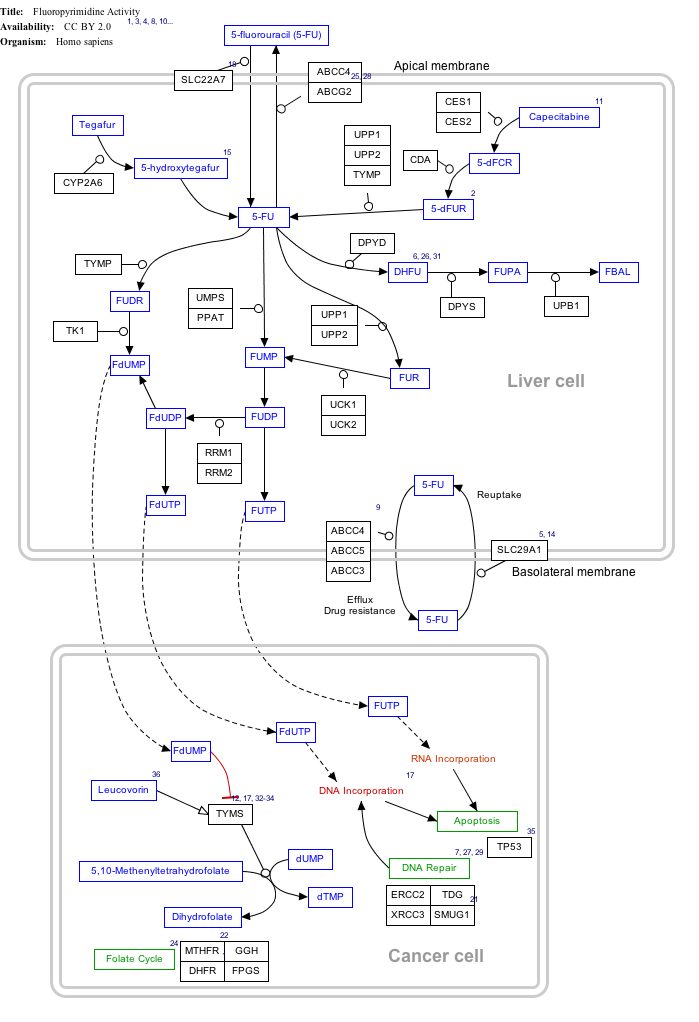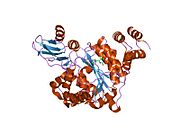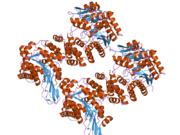TYMP (gene): Difference between revisions
standardize nomenclature to approved name, and reorganized for clarity |
clarify that this article is about the gene, whereas article Thymidine Phosphorylase is about the encoded enzyme |
||
| Line 1: | Line 1: | ||
{{Infobox_gene}} |
{{Infobox_gene}} |
||
''' |
'''TYMP''' is a gene that encodes for the enzyme [[thymidine phosphorylase]].<ref name="pmid1590793">{{cite journal | vauthors = Usuki K, Saras J, Waltenberger J, Miyazono K, Pierce G, Thomason A, Heldin CH | title = Platelet-derived endothelial cell growth factor has thymidine phosphorylase activity | journal = Biochem Biophys Res Commun | volume = 184 | issue = 3 | pages = 1311–6 |date=Jun 1992 | pmid = 1590793 | pmc = | doi =10.1016/S0006-291X(05)80025-7 }}</ref><ref name="pmid11733540">{{cite journal | vauthors = Spinazzola A, Marti R, Nishino I, Andreu AL, Naini A, Tadesse S, Pela I, Zammarchi E, Donati MA, Oliver JA, Hirano M | title = Altered thymidine metabolism due to defects of thymidine phosphorylase | journal = J Biol Chem | volume = 277 | issue = 6 | pages = 4128–33 |date=Feb 2002 | pmid = 11733540 | pmc = | doi = 10.1074/jbc.M111028200 }}</ref> The ''TYMP'' gene is also known as '''ECGF1''' (endothelial cell growth factor 1, platelet-derived) and '''MNGIE''' due to its role in [[Mitochondrial neurogastrointestinal encephalopathy syndrome|MNGIE syndrome]]. <ref>https://www.genenames.org/data/gene-symbol-report/#!/hgnc_id/HGNC:3148</ref> |
||
The ''TYMP'' gene is also known as '''ECGF1''' (endothelial cell growth factor 1, platelet-derived) and '''MNGIE''' due to its role in [[Mitochondrial neurogastrointestinal encephalopathy syndrome|MNGIE syndrome]]. <ref>https://www.genenames.org/data/gene-symbol-report/#!/hgnc_id/HGNC:3148</ref> |
|||
==Structure== |
==Structure== |
||
| Line 8: | Line 6: | ||
==Function== |
==Function== |
||
''TYMP'' encodes for the enzyme [[thymidine phosphorylase]]. |
|||
Thymidine phosphorylase an angiogenic [[growth factor]] which promotes [[angiogenesis]] in vivo and stimulates the in vitro growth of a variety of endothelial cells. |
|||
''TYMP'' and thymidine phosphorylase are associated with [[angiogenesis]], growth of [[endothelial cell]]s, and [[Mitochondrial neurogastrointestinal encephalopathy syndrome|mitochondrial neurogastrointestinal encephalomyopathy (MNGIE)]]. |
|||
Thymidine phosphorylasehas a highly restricted target cell specificity acting only on [[endothelial cell]]s, hence its alternative name of ECGF1. Because it limits glial cell proliferation, thymidine phosphorylase is also known as gliostatin. |
|||
Thymidine phosphorylase activity in leukocytes from [[Mitochondrial neurogastrointestinal encephalopathy syndrome|mitochondrial neurogastrointestinal encephalomyopathy (MNGIE)]] patients was less than 5 percent of controls, indicating that loss-of-function mutations in TYMP cause MNGIE.<ref>{{cite web | title = Entrez Gene: ECGF1 endothelial cell growth factor 1 (platelet-derived)| url = https://www.ncbi.nlm.nih.gov/sites/entrez?Db=gene&Cmd=ShowDetailView&TermToSearch=1890| accessdate = }}</ref> |
Thymidine phosphorylase is angiogenic [[growth factor]] which promotes [[angiogenesis]] in vivo and stimulates the in vitro growth of a variety of endothelial cells. Thymidine phosphorylase has a highly restricted target cell specificity acting only on [[endothelial cell]]s, hence its alternative name of ECGF1. Because it limits glial cell proliferation, thymidine phosphorylase is also known as gliostatin. Thymidine phosphorylase activity in leukocytes from [[Mitochondrial neurogastrointestinal encephalopathy syndrome|mitochondrial neurogastrointestinal encephalomyopathy (MNGIE)]] patients was less than 5 percent of controls, indicating that loss-of-function mutations in ''TYMP'' cause MNGIE.<ref>{{cite web | title = Entrez Gene: ECGF1 endothelial cell growth factor 1 (platelet-derived)| url = https://www.ncbi.nlm.nih.gov/sites/entrez?Db=gene&Cmd=ShowDetailView&TermToSearch=1890| accessdate = }}</ref> |
||
== Interactive pathway map == |
== Interactive pathway map == |
||
Revision as of 19:12, 11 September 2019
TYMP is a gene that encodes for the enzyme thymidine phosphorylase.[5][6] The TYMP gene is also known as ECGF1 (endothelial cell growth factor 1, platelet-derived) and MNGIE due to its role in MNGIE syndrome. [7]
Structure
The TYMP gene is located on chromosome 22 in humans and contains 10 exons spanning more than 4.3 kb.
Function
TYMP encodes for the enzyme thymidine phosphorylase.
TYMP and thymidine phosphorylase are associated with angiogenesis, growth of endothelial cells, and mitochondrial neurogastrointestinal encephalomyopathy (MNGIE).
Thymidine phosphorylase is angiogenic growth factor which promotes angiogenesis in vivo and stimulates the in vitro growth of a variety of endothelial cells. Thymidine phosphorylase has a highly restricted target cell specificity acting only on endothelial cells, hence its alternative name of ECGF1. Because it limits glial cell proliferation, thymidine phosphorylase is also known as gliostatin. Thymidine phosphorylase activity in leukocytes from mitochondrial neurogastrointestinal encephalomyopathy (MNGIE) patients was less than 5 percent of controls, indicating that loss-of-function mutations in TYMP cause MNGIE.[8]
Interactive pathway map
Click on genes, proteins and metabolites below to link to respective articles.[§ 1]
- ^ The interactive pathway map can be edited at WikiPathways: "FluoropyrimidineActivity_WP1601".
References
- ^ a b c GRCh38: Ensembl release 89: ENSG00000025708 – Ensembl, May 2017
- ^ a b c GRCm38: Ensembl release 89: ENSMUSG00000022615 – Ensembl, May 2017
- ^ "Human PubMed Reference:". National Center for Biotechnology Information, U.S. National Library of Medicine.
- ^ "Mouse PubMed Reference:". National Center for Biotechnology Information, U.S. National Library of Medicine.
- ^ Usuki K, Saras J, Waltenberger J, Miyazono K, Pierce G, Thomason A, Heldin CH (Jun 1992). "Platelet-derived endothelial cell growth factor has thymidine phosphorylase activity". Biochem Biophys Res Commun. 184 (3): 1311–6. doi:10.1016/S0006-291X(05)80025-7. PMID 1590793.
- ^ Spinazzola A, Marti R, Nishino I, Andreu AL, Naini A, Tadesse S, Pela I, Zammarchi E, Donati MA, Oliver JA, Hirano M (Feb 2002). "Altered thymidine metabolism due to defects of thymidine phosphorylase". J Biol Chem. 277 (6): 4128–33. doi:10.1074/jbc.M111028200. PMID 11733540.
{{cite journal}}: CS1 maint: unflagged free DOI (link) - ^ https://www.genenames.org/data/gene-symbol-report/#!/hgnc_id/HGNC:3148
- ^ "Entrez Gene: ECGF1 endothelial cell growth factor 1 (platelet-derived)".
Further reading
- Yang Q, Yoshimura G, Mori I, et al. (2002). "Thymidine phosphorylase and breast carcinoma". Anticancer Res. 22 (4): 2355–60. PMID 12174926.
- Asai K, Nakanishi K, Isobe I, et al. (1992). "Neurotrophic action of gliostatin on cortical neurons. Identity of gliostatin and platelet-derived endothelial cell growth factor". J. Biol. Chem. 267 (28): 20311–6. PMID 1400349.
- Furukawa T, Yoshimura A, Sumizawa T, et al. (1992). "Angiogenic factor". Nature. 356 (6371): 668. doi:10.1038/356668a0. PMID 1570012.
- Stenman G, Sahlin P, Dumanski JP, et al. (1992). "Regional localization of the human platelet-derived endothelial cell growth factor (ECGF1) gene to chromosome 22q13". Cytogenet. Cell Genet. 59 (1): 22–3. doi:10.1159/000133191. PMID 1733667.
- Hagiwara K, Stenman G, Honda H, et al. (1991). "Organization and chromosomal localization of the human platelet-derived endothelial cell growth factor gene". Mol. Cell. Biol. 11 (4): 2125–32. doi:10.1128/MCB.11.4.2125. PMC 359900. PMID 2005900.
- Ishikawa F, Miyazono K, Hellman U, et al. (1989). "Identification of angiogenic activity and the cloning and expression of platelet-derived endothelial cell growth factor". Nature. 338 (6216): 557–62. doi:10.1038/338557a0. PMID 2467210.
- Bardosi A, Creutzfeldt W, DiMauro S, et al. (1987). "Myo-, neuro-, gastrointestinal encephalopathy (MNGIE syndrome) due to partial deficiency of cytochrome-c-oxidase. A new mitochondrial multisystem disorder". Acta Neuropathol. 74 (3): 248–58. doi:10.1007/BF00688189. PMID 2823522.
- Miyazono K, Okabe T, Urabe A, et al. (1987). "Purification and properties of an endothelial cell growth factor from human platelets". J. Biol. Chem. 262 (9): 4098–103. PMID 3549724.
- Usuki K, Gonez LJ, Wernstedt C, et al. (1994). "Structural properties of 3.0 kb and 3.2 kb transcripts encoding platelet-derived endothelial cell growth factor/thymidine phosphorylase in A431 cells". Biochim. Biophys. Acta. 1222 (3): 411–4. doi:10.1016/0167-4889(94)90049-3. PMID 8038210.
- Maruyama K, Sugano S (1994). "Oligo-capping: a simple method to replace the cap structure of eukaryotic mRNAs with oligoribonucleotides". Gene. 138 (1–2): 171–4. doi:10.1016/0378-1119(94)90802-8. PMID 8125298.
- Hirano M, Silvestri G, Blake DM, et al. (1994). "Mitochondrial neurogastrointestinal encephalomyopathy (MNGIE): clinical, biochemical, and genetic features of an autosomal recessive mitochondrial disorder". Neurology. 44 (4): 721–7. doi:10.1212/wnl.44.4.721. PMID 8164833.
- Suzuki Y, Yoshitomo-Nakagawa K, Maruyama K, et al. (1997). "Construction and characterization of a full length-enriched and a 5'-end-enriched cDNA library". Gene. 200 (1–2): 149–56. doi:10.1016/S0378-1119(97)00411-3. PMID 9373149.
- Stevenson DP, Milligan SR, Collins WP (1998). "Effects of platelet-derived endothelial cell growth factor/thymidine phosphorylase, substrate, and products in a three-dimensional model of angiogenesis". Am. J. Pathol. 152 (6): 1641–6. PMC 1858429. PMID 9626068.
- Nishino I, Spinazzola A, Hirano M (1999). "Thymidine phosphorylase gene mutations in MNGIE, a human mitochondrial disorder". Science. 283 (5402): 689–92. doi:10.1126/science.283.5402.689. PMID 9924029.
- Asgari MM, Haggerty JG, McNiff JM, et al. (1999). "Expression and localization of thymidine phosphorylase/platelet-derived endothelial cell growth factor in skin and cutaneous tumors". J. Cutan. Pathol. 26 (6): 287–94. doi:10.1111/j.1600-0560.1999.tb01846.x. PMID 10472757.
- Loftus BJ, Kim UJ, Sneddon VP, et al. (1999). "Genome duplications and other features in 12 Mb of DNA sequence from human chromosome 16p and 16q". Genomics. 60 (3): 295–308. doi:10.1006/geno.1999.5927. PMID 10493829.
- Sivridis E, Giatromanolaki A, Koukourakis MI, et al. (2000). "Thymidine phosphorylase expression in normal and hyperplastic endometrium". J. Clin. Pathol. 53 (9): 704–8. doi:10.1136/jcp.53.9.704. PMC 1731246. PMID 11041061.
- Komatsu T, Yamazaki H, Shimada N, et al. (2001). "Involvement of microsomal cytochrome P450 and cytosolic thymidine phosphorylase in 5-fluorouracil formation from tegafur in human liver". Clin. Cancer Res. 7 (3): 675–81. PMID 11297264.
- Kojima H, Shijubo N, Abe S (2002). "Thymidine phosphorylase and vascular endothelial growth factor in patients with Stage I lung adenocarcinoma". Cancer. 94 (4): 1083–93. doi:10.1002/cncr.10352. PMID 11920479.










